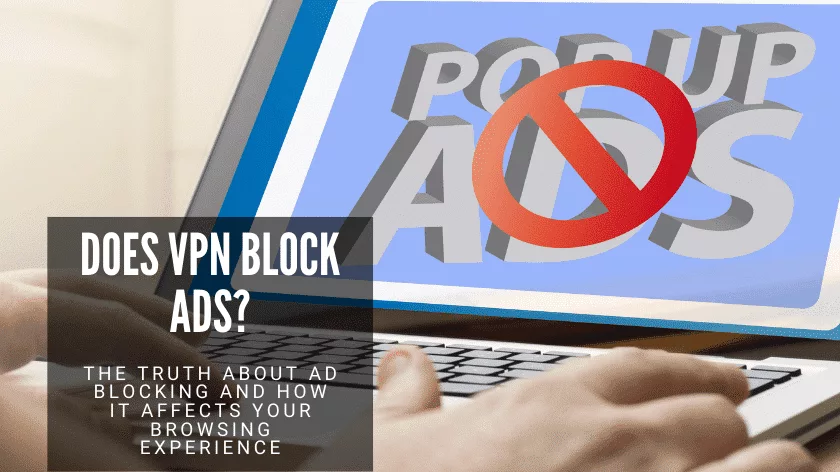It’s no secret that the use of ad blockers is rising, with over 38% of internet users using them to enhance their browsing experience, according to a recent study [1]. And as people become increasingly fed up with intrusive and irrelevant ads, it won’t be surprising to see that number rise even further. But does VPN block ads?
The short answer is: it depends. A VPN focuses mainly on encrypting your traffic and routing it through a secure server, which can help to improve your privacy and security online. However, some VPN providers also offer ad-blocking features as an additional layer of protection.
In this blog post, we’ll look at the truth about ad blocking, how it affects your browsing experience, and what role VPNs can play in all of this.
So, let’s get started!
What Is Ad Blocking? An Overview Of How It Works
Ad blocking is a technology that prevents ads from being displayed on your device. It does this by intercepting your traffic and blocking requests to ad servers.
There are two main types of ad blockers: browser-based and network-based. Browser-based ad blockers are usually extensions or add-ons that you can install on your web browser. Network-based ad blockers, on the other hand, work at the network level and can be either hardware- or software-based.
Ad blockers usually come with rules or filters that determine which requests should be blocked. For example, some ad blockers may block all requests to known ad servers, while others may only block certain types of ads, such as those that are intrusive or disruptive.
What Are The Benefits of Ad Blocking?
Ad blocking can improve your browsing experience in many ways.
For starters, it can help to reduce page loading times as fewer resources need to be loaded. If you’re on a slow or metered internet connection, this can be a huge benefit.
Ad blocking can also protect you from malware and other potential security threats that might be embedded in ads. And as we mentioned earlier, it can also help to block intrusive and disruptive ads that may interfere with your browsing experience.
Finally, ad blocking can respect your privacy by preventing third-party trackers from collecting data about your online activity.
Why Do People Use Ad Blockers?
The most common reason people use ad blockers is that they don’t want to be tracked. It’s easy to think that your privacy has been invaded in some way when you see an advertisement. This is often the case with businesses and marketers using data mining or other tracking methods and following internet users as they browse the web.
Ad blocking helps protect you from this kind of information gathering, which can sometimes lead to your data being misused in various ways, including identity theft, fraud, and phishing scams.
Another common reason people use ad blockers is to improve their browsing experience. As we mentioned earlier, ads can sometimes be intrusive, disruptive, and slow down page loading times. You can enjoy a smoother and more streamlined browsing experience by blocking ads.
Finally, some people use ad blockers because they find ads visually unattractive and distracting – which is why many websites employ dark colors, animations, and images with sound effects to try and keep people from skipping over their content altogether.
Reasons To Turn Your Ad Blocker Off
Ad blockers can be an effective tool for avoiding unwanted ads. However, there are also many reasons why you might want to turn your ad blocker off.
First and foremost, ads are how many websites make money. If you’re blocking all ads, you’re essentially denying these website owners the revenue they need to keep their sites running. This is why some websites will ask you to disable your ad blocker before allowing you to view their content.
Another reason you might want to turn your ad blocker off is because it can sometimes interfere with how a website functions. This is especially true for websites that rely heavily on advertising for revenue. In some cases, ad blockers can cause elements of a website to break or not load properly.
And finally, some ad blockers can increase your security risks by blocking ads from trusted sources. This is because ad blockers generally don’t differentiate between good and bad ads – they simply block all ads. As a result, you might end up inadvertently blocking an important security update or patch that’s being delivered through an ad.
Ad Blocker vs VPN: Do I Need an Ad Blocker If I Have a VPN?
Since the main idea behind a VPN is to protect your privacy, you might think you don’t need an ad blocker if you’re already using a VPN.
But there are a few reasons why you might still want to use an ad blocker even if you have a VPN. The first is that ad blockers will still have a role to play in improving your browsing experience. It does this by blocking intrusive and disruptive ads as well as those that slow down page loading times.
Another reason to use an ad blocker is that VPNs can sometimes have trouble blocking certain types of content. This is because some websites can detect when you’re using a VPN and will accordingly serve different content – including ads. Using an ad blocker in addition to your VPN can help ensure that you’re seeing the content you want to see.
However, some VPNs on the market offer built-in ad blockers. So if you’re using a VPN with this feature, you might not need to use a separate ad blocker.
The bottom line is that whether or not you need an ad blocker depends on your individual needs and preferences. A VPN is probably all you need if you’re primarily concerned with privacy. But if you’re also interested in improving your browsing experience, then an ad blocker might also be a good idea.
Does a VPN Block Ads?
No, a VPN typically does not block ads; its primary purpose is to encrypt your traffic and route it through a server in another location, but it cannot stop ads from being served. However, there are some ways to use a VPN in conjunction with an ad blocker to achieve a similar effect.
One way to do this is to use a VPN with a DNS-based ad blocker. This will block ads at the DNS level, which means that they will never even be loaded by your browser.
Another way to use a VPN to block ads is to connect to a server in a country where advertising companies are not allowed to operate. This won’t work for all ads, but it can be effective for some.
You can also use a VPN to encrypt your traffic, making it more difficult for ad networks to track you. This won’t block all ads, but it will make it harder for them to target you with personalized ads.
How to Pick a Good VPN with Ad Blocking
Choosing the best VPN for ad blocking can be tricky, as not all VPNs are created equal. Here are a few things to look for when choosing a VPN:
- Does the VPN offer DNS-based ad blocking?
- Does the VPN have servers in countries where advertising companies cannot operate?
- Does the VPN encrypt your traffic?
- Does the VPN have a good privacy policy?
- Does the VPN have a good reputation?
Ad blocking is an important part of online privacy, and a good VPN can help you achieve it. Be sure to consider the above factors when choosing a VPN to get the best possible experience.
Summary – Does VPN Block Ads?
Ad blockers and VPNs both serve a purpose in terms of protecting your online privacy and browsing experience. A VPN encrypts your traffic and routes it through a server in another location, while an ad blocker blocks ads at the DNS level.
Using both may be in your best interest if you’re concerned about privacy and the browsing experience. Whether you use separate tools depends on if your VPN has a built-in ad blocker as a feature.
If it does, then it’s likely that you won’t need to use a separate ad blocker. But if your VPN does block ads as standard, it’s probably a good idea to consider using a DNS-based ad blocker in addition. This will help ensure that you do not see any ads while browsing the web and can enjoy a more streamlined experience.
Do some research to figure out what the best option is for you and your needs. Consider encryption, authentication, speed, reliability, and anonymity when making your decision. Once you’ve found the right VPN for you, enjoy increased privacy and a better browsing experience!




Leave a Reply